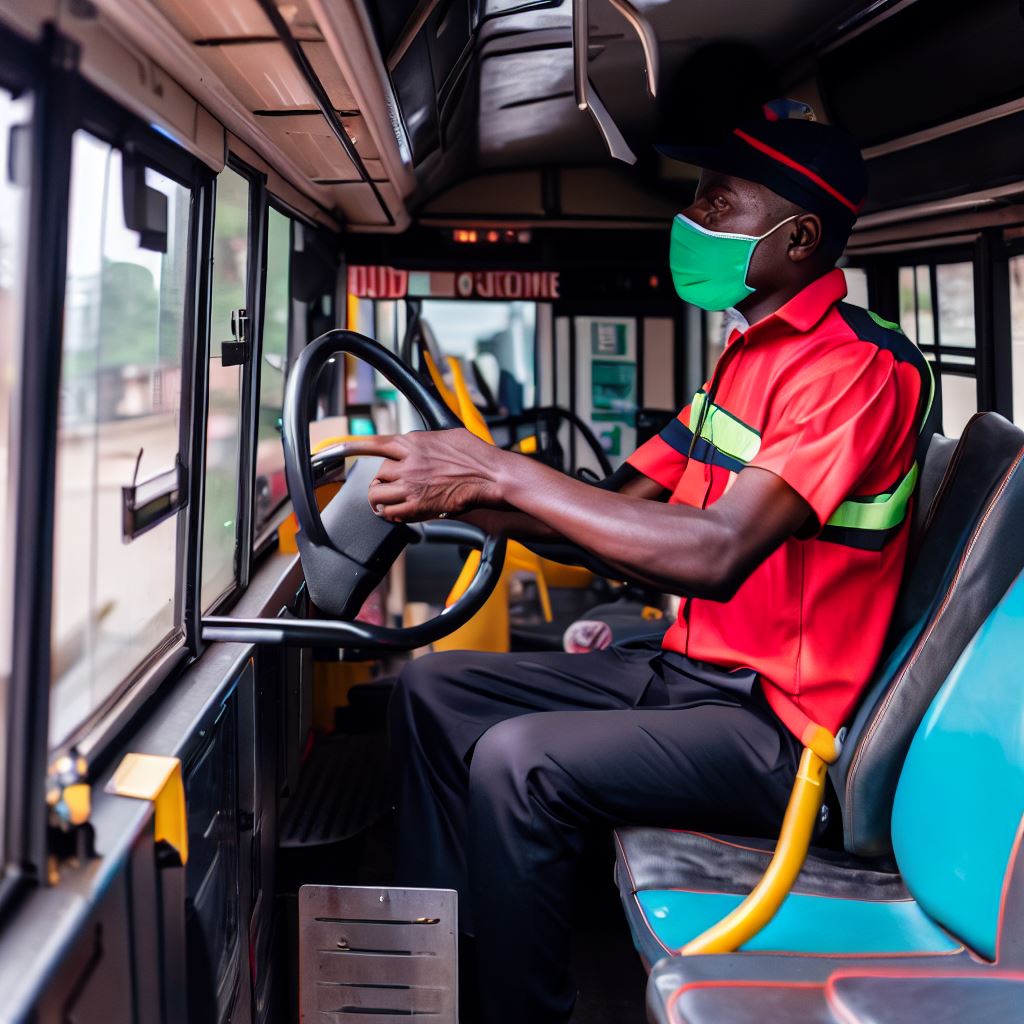Introduction
In this blog post we delve into tips From bus driver for passengers In the bustling streets of Nigeria’s vibrant cities, Nigerian bus drivers are unsung heroes.
Their unmatched expertise in maneuvering through chaotic traffic jams has earned them a reputation as skilled professionals.
Beyond their remarkable driving abilities, these drivers also have valuable advice to offer passengers.
A. Brief introduction to Nigerian bus drivers
These drivers are more than just individuals behind the wheel; they are seasoned navigators of the urban jungle.
Their keen instincts and swift decision-making abilities keep passengers safe amidst the frenzied traffic.
B. Importance of their advice for passengers
Their advice is crucial for passengers to ensure a smooth and safe journey in Nigeria’s bustling cities.
Understand the Nigerian Transportation System
Understanding the Nigerian transportation system is crucial for navigating the public transportation system effectively.
Here are some tips to help you utilize the system efficiently:
A. Familiarize yourself with the Nigerian transportation system
- Research and learn about the different modes of public transportation available in Nigeria.
- Understand the infrastructure and the major hubs where buses and other modes of transport operate.
Public transportation in Nigeria
- Nigeria has a diverse public transportation system that includes buses, taxis, motorcycles, tricycles, and ferries.
- Buses are the most common mode of public transportation, serving both intra-city and inter-city routes.
B. Types of buses and their routes
- There are various types of buses in Nigeria, including mini-buses, molue buses, danfo buses, and BRT (Bus Rapid Transit) buses.
- Each type of bus has its own routes, so it is important to know which bus type operates on your desired route.
Understanding bus fares and payment methods
- Bus fares in Nigeria can vary depending on the distance traveled and the type of bus.
- Some buses require cash payment, while others have implemented electronic payment systems for convenience.
Planning your journey
- Before embarking on a bus journey, plan your route and identify the nearest bus stop to your destination.
- Use online platforms or ask locals for information on bus routes and schedules.
C. Navigating the system effectively
- Arrive at the bus stop early to secure your seat, as buses in Nigeria can get crowded quickly.
- Avoid peak hours and heavy traffic by traveling during off-peak times.
- Be prepared for delays, as traffic congestion is common in Nigerian cities.
Safety precautions while using public transportation
- Keep your belongings secure and be cautious of pickpockets.
- If possible, avoid displaying valuable items to minimize the risk of theft.
- Be aware of your surroundings and always trust your instincts.
Interacting with bus drivers and conductors
- Bus drivers and conductors play a vital role in ensuring a smooth journey.
- Communicate your destination clearly to the bus conductor, as they assist in collecting fares and directing passengers.
Etiquette tips for passengers
- Respect the seating arrangement and offer your seat to vulnerable individuals such as the elderly or pregnant women.
- Keep noise levels low and avoid distracting the driver or other passengers.
Adaptability and patience
- Embrace the unique experience of using public transportation in Nigeria and be patient with any challenges that may arise.
- Stay informed about any changes or disruptions in the transportation system through reliable sources.
Navigating the Nigerian public transportation system may seem daunting at first, but with these tips, you can confidently explore the country while enjoying the cultural aspects it has to offer.
Remember to plan ahead, stay alert, and embrace the adventure!
Respect the Bus Driver
Nigerian bus drivers are the unsung heroes of our daily commute, navigating through the chaos of traffic to get us to our destinations safely.
But have you ever wondered what advice these seasoned drivers might offer to passengers?
Here are some valuable tips straight from the drivers themselves:
- Arrive on Time: Bus drivers are on tight schedules. Being at the bus stop a few minutes before departure ensures a smooth boarding process and helps them stay on track.
- Be Patient: Traffic jams and delays are part of city life. Instead of getting frustrated, be patient; your driver is doing their best.
- Respect Their Space: While it’s okay to strike up a friendly conversation, remember that drivers need to focus on the road. Avoid distracting them with long chats.
- Safety First: Always use handrails when boarding and exiting the bus. It keeps you safe and helps maintain the schedule.
- Stay Informed: Pay attention to announcements and route changes. This ensures you’re prepared for any adjustments during your journey.
- Keep It Clean: Dispose of your trash properly. A clean bus is a more pleasant experience for everyone.
Remember, these tips not only make the bus driver’s job easier but also contribute to a smoother, more enjoyable ride for all passengers.
So, let’s show our appreciation by being responsible and considerate passengers.
Follow Safety Guidelines
- Listen to the instructions of the bus driver and comply with them.
- Fasten your seatbelt if it is available, as it can save your life in case of an accident.
- Secure your personal belongings properly to prevent them from getting lost or stolen.
- Always be aware of the emergency exits on the bus and familiarize yourself with the evacuation procedures.
When traveling on a bus, it is crucial to prioritize your safety and follow the guidelines provided.
The bus driver’s advice can serve as a valuable resource to ensure a safe journey.
One of the most important aspects of being a passenger is to follow safety guidelines.
The bus driver is responsible for the safety and well-being of all the passengers, and it is essential to listen to their instructions and comply with them.
By doing so, you contribute to creating a secure environment for everyone on board.
A. Importance of Wearing Seatbelts, If Available
Seatbelts play a crucial role in preventing injuries during a bus journey. It is essential to fasten your seatbelt whenever it is available, even if the ride seems smooth.
In case of sudden stops, unexpected turns, or even accidents, a seatbelt can save your life.
It keeps you securely in your seat and reduces the risk of severe injuries.
B. Keeping Personal Belongings Secure
When traveling on a bus, it is essential to keep your personal belongings secure.
Make sure to place your bags and other belongings under your seat or in the overhead compartments.
Additionally, always keep an eye on your belongings to prevent theft or loss.
By taking these precautions, you can enjoy your journey without worrying about your personal items.
C. Being Aware of Emergency Exits and Procedures
An emergency can happen at any time, and it is crucial to be prepared. Familiarize yourself with the location of emergency exits on the bus.
Pay attention when the driver explains the evacuation procedures in case of an emergency.
By knowing your way out, you can react quickly and help others evacuate safely.
In short, ensuring your safety while traveling on a bus requires following safety guidelines, wearing seatbelts if available, keeping personal belongings secure, and being aware of emergency exits and procedures.
By adhering to these practices, you contribute to creating a safe and secure environment for yourself and your fellow passengers.
Remember, the bus driver’s advice serves as a valuable resource, so always listen and comply with their instructions for a smooth and secure journey.
Be Punctual and Patient
As we continue our journey through the bustling streets of Nigeria, it’s essential to heed the advice of local bus drivers.
By adhering to their tips, you’ll discover that being punctual and patient can significantly enhance your experience.
Time is a precious commodity, so don’t let it slip away.
Nigerian bus drivers operate on a tight schedule, and delays can disrupt not only their plans but also those of fellow passengers.
1. The concept of “Nigerian time” and its influence on bus schedules
In Nigeria, there is a cultural occurrence known as “Nigerian time,” which refers to the relaxed approach to punctuality.
However, this doesn’t apply to bus schedules as they strive to maintain their timeliness.
2. Arriving at the bus stop early to secure a seat
To maximize your chances of securing a seat on the bus, arrive at the bus stop well in advance.
The early bird catches the worm, or in this case, a comfortable seat.
3. Remaining patient during delays
Despite the best efforts of bus drivers, unforeseen circumstances may lead to delays.
It’s in these moments where your patience will be tested.
Take a deep breath and remind yourself that delays are temporary.
4. Managing overcrowded situations
With Nigeria’s booming population, buses can become quite crowded.
Instead of succumbing to frustration, approach the situation with understanding.
Remember, everyone is trying to reach their destination just like you.
5. Prioritizing courtesy
In overcrowded situations, it’s imperative to prioritize courtesy.
Offer your seat to the elderly, pregnant women, or individuals with disabilities.
Small acts of kindness can go a long way in creating harmony amongst passengers.
6. Maintaining personal belongings
Ensuring the safety of your belongings is paramount on Nigerian bus rides.
Keep a watchful eye on your bags and avoid displaying valuables that may attract unwanted attention.
7. Respect the bus driver’s authority
Nigerian bus drivers hold a position of authority and should be respected.
Follow their instructions and guidelines, as they are responsible for ensuring your safety and a smooth journey.
8. Taking advantage of rest stops
Long journeys often include rest stops where passengers can stretch their legs and freshen up.
Utilize these breaks wisely, but remember to return to the bus promptly to avoid further delays.
9. Embracing the camaraderie
Bus rides in Nigeria offer a unique opportunity to interact with fellow passengers.
Embrace the camaraderie by engaging in friendly conversations, sharing stories, and embracing the diverse cultures that surround you.
10. Being open to cultural experiences
Nigerian bus travel allows you to witness the vibrant tapestry of the country’s culture.
Be open-minded and relish the chance to explore new perspectives and customs while on your journey.
11. Adapting to the rhythm of Nigerian life
Embrace the rhythm of Nigerian life as you travel by bus.
Let go of rigid schedules and immerse yourself in the vibrant chaos that characterizes this beautiful country.
By following the tips presented here and adopting a mindset of punctuality and patience, you’ll have a much more enjoyable and fulfilling experience navigating Nigerian bus travel.
Remember, traveling is not solely about reaching your destination; it’s also about the journey itself.
Read: Sound Engineering Tech Trends in Nigeria

Maintain Personal Hygiene
Maintain personal hygiene at all times, especially while traveling, to keep yourself and others healthy.
Cleanliness is of utmost importance to prevent the spread of germs and diseases.
Proper etiquette for personal grooming is essential to create a pleasant environment for everyone.
Remember to bring sanitizers or wipes to ensure proper hygiene and cleanliness during your journey.
- Maintain personal hygiene: It is crucial to prioritize personal hygiene, even more so when traveling. This includes regular handwashing, wearing clean clothes, and keeping oneself neat and tidy.
- Importance of cleanliness while traveling: When traveling, you come in contact with numerous surfaces that may harbor bacteria and viruses. Maintaining cleanliness reduces the risk of contracting infections and illnesses.
- Proper etiquette for personal grooming: Follow basic etiquette for personal grooming to create a comfortable and respectful environment for yourself and fellow passengers. Trim nails, brush hair, and maintain oral hygiene.
- Bring sanitizers or wipes for hygiene purposes: In addition to frequent handwashing, it is advisable to carry sanitizers or wipes to clean your hands and frequently touched surfaces such as armrests, tray tables, and seatbelts.
Personal Hygiene Tips for Passengers
Maintaining personal hygiene while traveling is not only crucial for your well-being but also for the comfort and health of those around you.
These practical tips from seasoned bus drivers will help you stay clean and considerate:
- Prioritize Hand Hygiene: Always begin with clean hands. Wash your hands thoroughly with soap and water for at least 20 seconds before and after eating, using the restroom, or touching potentially contaminated surfaces.
- Hand Sanitizers are Your Friends: Carry a travel-size hand sanitizer containing at least 60% alcohol. Apply it when soap and water aren’t readily available or as an extra precaution after washing your hands.
- Cover Up: When you need to cough or sneeze, use a tissue or your elbow to cover your mouth and nose.
- Dispose Responsibly: Dispose of used tissues, wrappers, and waste materials in designated trash bins to maintain cleanliness and prevent unpleasant odors.
- Clean Your Belongings: Regularly clean and sanitize your personal items, including luggage, bags, and electronic devices, to minimize the risk of contamination during travel.
- Hands Off Your Face: Refrain from touching your face, especially your eyes, nose, and mouth, to reduce the risk of transferring germs.
- Respect Respiratory Etiquette: If you’re feeling unwell, wear a mask or use a cloth to cover your mouth and nose. This shows consideration for fellow passengers.
- Mind Personal Odor: Avoid strong perfumes or fragrances that may discomfort others. Practice good grooming for a pleasant travel experience.
- Respect Shared Spaces: When using communal areas like restrooms or eating areas, leave them clean and tidy for the next person.
Remember, maintaining hygiene during your journey is a shared responsibility.
By following these tips, you can ensure a healthy and comfortable ride for everyone.
Read: Networking for Sound Engineers in Nigeria
Keep Valuables Safe
When traveling by bus in Nigeria, it’s crucial to keep your valuables safe to avoid theft or misplacement of belongings.
Follow these tips for securing your personal items and deter thieves:
A. Precautions to Avoid Theft or Misplacement of Belongings
- Always keep an eye on your belongings and never leave them unattended.
- Choose a secure bag or backpack with strong zippers and compartments.
- Keep your wallet, phone, and important documents in a hidden pocket or a money belt.
- Divide your money and store it in different places for added security.
- Avoid flashing large amounts of money or expensive items in public.
- Be cautious of your surroundings and trust your instincts if something feels off.
- Consider using travel locks or cable ties to secure your luggage.
B. Tips for Securing Personal Items during the Journey
- Keep your bags within your reach or tightly secured under your seat.
- If available, use overhead compartments to store smaller bags within your line of sight.
- Try to sit near the aisle rather than by the window, making it easier to keep an eye on your belongings.
- If carrying a handbag or backpack, keep it in front of you, so you can always see it.
- Never place your belongings on the floor or between your legs where pickpockets can easily access them.
C. Avoiding Flashy Displays of Valuables to Deter Thieves
- Avoid wearing expensive jewelry or showing off flashy gadgets while in transit.
- Store your electronic devices, such as laptops or tablets, in a discreet bag or cover.
- Use headphones instead of playing music or videos aloud to avoid drawing attention.
- Keep your camera or smartphone in a secure pocket or a bag when not in use.
- If using a laptop or tablet, sit with your back against a wall or seat to prevent quick grab-and-run thefts.
- Consider using password protection and tracking apps on your electronic devices.
By being cautious and taking necessary precautions, you can greatly minimize the risk of theft and protect your belongings during bus journeys in Nigeria.
Remember to stay alert, keep your valuables hidden, and enjoy your travel experience with peace of mind.
Read: Sound Engineering: A Growing Field in Nigeria
Understanding Nigerian Bus Culture
- Bus travel in Nigeria is a unique experience that requires an understanding of the local culture.
- Be prepared for crowded buses, as they are often filled to their maximum capacity.
- Patience is key when waiting for a bus, as they may not always run on a strict schedule.
- Don’t be alarmed by the loud honking and fast driving, it’s simply a part of the Nigerian driving style.
- Respect the bus driver and other passengers, and follow their lead when it comes to boarding and exiting the bus.
A. Embracing the Lively Atmosphere on Nigerian Buses
- Let go of any preconceived notions and embrace the lively atmosphere on Nigerian buses.
- Engage in conversations with fellow passengers, as it is a great way to learn about the local culture.
- Enjoy the vibrant music that is often played on the bus, and feel free to join in the singing and dancing.
- Keep an open mind and be prepared for unexpected stops, as buses might pick up and drop off passengers anywhere.
- Appreciate the sense of community that exists on Nigerian buses, as people often help each other during the journey.
B. Learning Local Phrases and Customs to Interact with Other Passengers
- Learning a few basic local phrases can enhance your experience and help you connect with other passengers.
- Greet your fellow passengers using Nigerian customs, such as saying “good morning” or “good evening.”
- Engage in conversations and show interest in the lives of others to build connections.
- Use the local phrases for common bus terms like “stop” or “next bus stop” to communicate with the driver.
- Be polite and courteous, as Nigerians greatly appreciate respectful interactions.
C. Being Open-minded and Respectful towards Cultural Differences
- Approach the Nigerian bus culture with an open mind and a willingness to adapt to new experiences.
- Respect the cultural norms and customs of the local people, even if they differ from your own.
- Avoid making assumptions or judgments about the way things are done in Nigeria, and instead embrace the differences.
- Be mindful of personal space, as Nigerians may have different notions of personal boundaries.
- Appreciate the diversity of the Nigerian bus culture and the opportunity it provides to learn and grow as an individual.
In fact, traveling on Nigerian buses can be a fascinating experience if approached with the right mindset.
Understanding the local bus culture, embracing the lively atmosphere, learning local phrases, and being open-minded and respectful towards cultural differences are essential factors for a successful journey.
So, hop on a Nigerian bus, enjoy the ride, and immerse yourself in the rich culture of this vibrant country!
Read: Becoming a Wind Turbine Tech in Nigeria: A Step-by-Step Guide
Learn More: Challenges Faced by Political Scientists in Nigeria Today
Find Out More: Culinary Events in Nigeria: A Chef’s Participation
You Might Also Like: Top Culinary Schools in Nigeria for Aspiring Chefs
Conclusion
It is crucial for passengers to adhere to the guidelines provided by Nigerian bus drivers.
Publish Your Professional Profile, Business or Brand
Showcase your expertise, gain trust, and boost visibility instantly on Professions.ng.
Publish NowBy following these tips, passengers can ensure a smooth and enjoyable journey.
Remember to arrive early, respect the driver’s authority, and be mindful of safety regulations.
Sharing this knowledge with others will contribute to a better travel experience for everyone in Nigeria.
Let’s create a culture of responsible and considerate passengers for a more comfortable and efficient transportation system.




